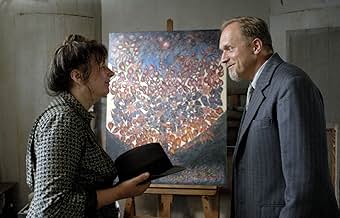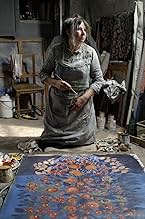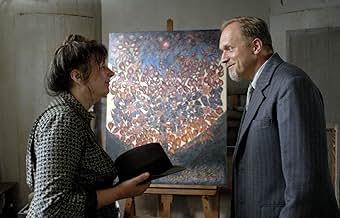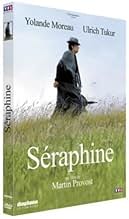IMDb-BEWERTUNG
7,4/10
6663
IHRE BEWERTUNG
Basierend auf dem Leben der französischen Malerin Séraphine de Senlis.Basierend auf dem Leben der französischen Malerin Séraphine de Senlis.Basierend auf dem Leben der französischen Malerin Séraphine de Senlis.
- Regie
- Drehbuch
- Hauptbesetzung
- Auszeichnungen
- 20 Gewinne & 10 Nominierungen insgesamt
Léna Breban
- Soeur Marguerite
- (as Léna Bréban)
Sandrine Bodenes
- Marie-Louise
- (as Sandrine Bodènés)
Anne Benoît
- Madame Delonge
- (as Anne Benoit)
Empfohlene Bewertungen
Seraphine Louis,who would eventually change her name to Seraphine deSenlis (after the name of her hometown)was an artist who cleaned houses by day,and painted by night (all the time while singing the hymns of her staunch Catholic upbringing,while she was growing up an orphan by Nuns). Seraphine is pretty much maligned by the village locals,taunted by children,and pretty much avoided by most all that know her. When German art collector & critic,Wilhelm Uhde rents a room in the town of Senlis,while on the run from the insanity of World War I,and discovers a painting by Seraphine & is amazed by it's use of colour & texture. When the war moves ever closer,Uhde & his sister escapes the madness. Years later,he returns to Senlis,rediscovers an aged,but still painting Seraphine & vows to put her work on display (despite the fallout of the Wall Street crash of 1929,as well as the subsequent great depression,that managed to cripple a good percentage of Europe's economy,as well). Martin Provost directs & co writes (with Marc Abdelnoir)a lovingly depicted portrait of a woman possessed of genius that is cruelly stolen too early (deSenlis spent her aged years in an insane asylum & never painted again in life). Yolande Moreau plays Seraphine,a woman unpossesed by pretentious,real fine. Ulrich Tukur plays Wilhelm Uhde,in a winning role that depicts Uhde as an impresario of art first,and who's personal life is down played,somewhat (in life,Uhde was an ardent homosexual that made no bones about his gay lifestyle). The photography is a real treat for the eye (at times,the composition of visual images are very painterly,such as films such as 'Tous Le Matin Du Monde'). A film to check out for those with a love of art,or art history (or both). Spoken in French & German with English subtitles. Not rated by the MPAA,this film contains flashes of nudity & adult content.
10JustApt
This extraordinary biographical film tells the dramatic story of French paintress Séraphine de Senlis. The tale starts in the summer before the First World War when a known German art collector and critic Wilhelm Uhde accidentally finds out that his servant woman is an amateur artiste painting in naïve but highly innovative and original style. She was doing so because she had a vision of divine being who has told her to begin to paint pictures. Where does genius end and madness begin? Or are they just two sides of the same phenomenon? Questions poised by this artful drama hardly have the answers. To say that Yolande Moreau playing the role of Séraphine Louis is unique is to say the least. Camille Claudel is another brilliant movie in the same vein.
A frumpy cleaning woman well into middle age is discovered by an art critic to be a painter with talent comparable to Vincent Van Gogh. Her story is told in the riveting Seraphine, directed by Martin Provost and winner of seven Césars, the French version of the Oscars, including a best actress award for Yolande Moreau. With a screenplay by Martin Provost and Marc Abdelnour, the film is set in the village of Senlis outside of Paris where Séraphine Louis (Yolande Moreau) lives alone and must take odd jobs just to pay for her painting supplies. Séraphine is a visionary, a devout Catholic who believes she is guided by a guardian angel and her exotic paintings of flowers and plants describe her feelings of closeness to spirit.
Treated with disdain by her condescending employer, her life takes on new meaning when a tenant, German art critic Wilhelm Uhde (Ulrich Tukur) hires Séraphine to clean for him and accidentally discovers one of her paintings that her boss had tossed aside. A champion of modern "primitvist" artists who is credited with early recognition of Picasso and Rousseau, Uhde is portrayed by Tukur as a quiet, unassuming man who lives with his sister and a gay lover. He recognizes Séraphine's talent but never shows much enthusiasm, preferring to keep their relationship on a very business-like basis.
Impressed by Seraphine's passionate art, Uhde offers to become her patron but, feeling estranged in France, must soon leave the country to return to Germany as the First World War begins. Although Séraphine continues to paint, she has no connection with Uhde until the latter part of the 1920s when he provides her with the means to quit her job and paint full time. Unfortunately, her grip on reality falters and she is soon hospitalized after indulging in spending sprees on a wedding dress and purchase of a large mansion. One of the saddest scenes in the film is that of Séraphine dressed in a full wedding gown, going door to door giving her away her possessions.
Provost in Séraphine captures the artist's mystical nature and her close bond with nature that shows up in her works, which are still exhibited in many of the world's museums. She is shown hugging trees, climbing them, and standing as a tiny speck beneath a towering shade tree. One scene shows her standing nude in water up to her chest in a nearby river. Provost takes a minimalist approach and the film does not contain much dialogue. The story is told by the silences and facial expressions and the music by Michael Galasso adds richness to the experience. Fully capturing the eternal mystery of the creative process, Séraphine itself is a work of art.
Treated with disdain by her condescending employer, her life takes on new meaning when a tenant, German art critic Wilhelm Uhde (Ulrich Tukur) hires Séraphine to clean for him and accidentally discovers one of her paintings that her boss had tossed aside. A champion of modern "primitvist" artists who is credited with early recognition of Picasso and Rousseau, Uhde is portrayed by Tukur as a quiet, unassuming man who lives with his sister and a gay lover. He recognizes Séraphine's talent but never shows much enthusiasm, preferring to keep their relationship on a very business-like basis.
Impressed by Seraphine's passionate art, Uhde offers to become her patron but, feeling estranged in France, must soon leave the country to return to Germany as the First World War begins. Although Séraphine continues to paint, she has no connection with Uhde until the latter part of the 1920s when he provides her with the means to quit her job and paint full time. Unfortunately, her grip on reality falters and she is soon hospitalized after indulging in spending sprees on a wedding dress and purchase of a large mansion. One of the saddest scenes in the film is that of Séraphine dressed in a full wedding gown, going door to door giving her away her possessions.
Provost in Séraphine captures the artist's mystical nature and her close bond with nature that shows up in her works, which are still exhibited in many of the world's museums. She is shown hugging trees, climbing them, and standing as a tiny speck beneath a towering shade tree. One scene shows her standing nude in water up to her chest in a nearby river. Provost takes a minimalist approach and the film does not contain much dialogue. The story is told by the silences and facial expressions and the music by Michael Galasso adds richness to the experience. Fully capturing the eternal mystery of the creative process, Séraphine itself is a work of art.
Séraphine was one of these so called common people who in the early 1900s were discovered. The expression "discovered" is not wrong, but that wasn't just about the person, it's was also about another type of seeing and another type of expression.
Séraphine lived a poor and humiliating life like most women of her class. Then this German art collector finds her. But it stops there, because for certain reasons he in the end can't improve her life materially. And the result is disastrous, because it means betrayal of a person, although not of her art.
A silent realistic movie, there you can smell the poverty and despair.
Séraphine lived a poor and humiliating life like most women of her class. Then this German art collector finds her. But it stops there, because for certain reasons he in the end can't improve her life materially. And the result is disastrous, because it means betrayal of a person, although not of her art.
A silent realistic movie, there you can smell the poverty and despair.
A beautifully crafted film about a genius with a gentle soul set in a time of war and recession. The sense of period is brought to life in this heart warming tale of Seraphine de Senlis. Anyone who has ever laid under a large tree as the leaves rustle in the wind or near the waters edge as the sea laps the shore, will appreciate the calm and beauty contained in this wonderful film.
WUSSTEST DU SCHON:
- WissenswertesSince the film's release, the number of visitors at the museum of Senlis exhibiting Séraphine's works has quadrupled (August 2009).
- PatzerThe film opens in 1914 showing the arrival of Wilhelm and Anne-Marie at the village. Wilhelm actually arrived in 1912, two years before the start of the war.
- Crazy CreditsThe credits list the names of the paintings which are seen in the film - 10 paintings by Séraphine and the artworks owned by Uhde and Kolle.
- SoundtracksConsonent laudes!
Written by Louis Rousseau
Performed by Yolande Moreau, Françoise Lebrun and Léna Breban
Top-Auswahl
Melde dich zum Bewerten an und greife auf die Watchlist für personalisierte Empfehlungen zu.
- How long is Seraphine?Powered by Alexa
Details
Box Office
- Budget
- 3.674.000 € (geschätzt)
- Bruttoertrag in den USA und Kanada
- 884.613 $
- Eröffnungswochenende in den USA und in Kanada
- 38.637 $
- 7. Juni 2009
- Weltweiter Bruttoertrag
- 9.402.702 $
- Laufzeit2 Stunden 5 Minuten
- Farbe
- Sound-Mix
- Seitenverhältnis
- 1.85 : 1
Zu dieser Seite beitragen
Bearbeitung vorschlagen oder fehlenden Inhalt hinzufügen



































